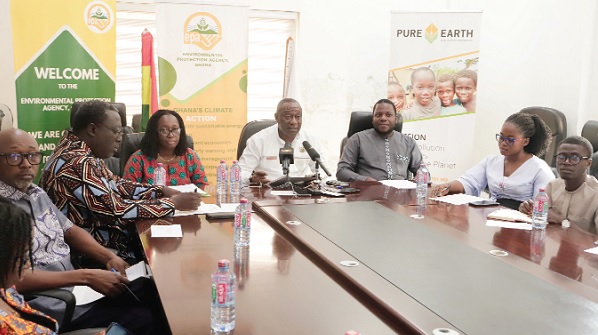Climate Change & Energy
High lead levels in cooking pots worrying — EPA
Source: graphic - September 18, 2023

Dr Henry Kwabena Kokofu (4th from right), Executive Director, Environmental Protection Agency, making a statement during the media briefing
The Environmental Protection Agency (EPA) is developing an action plan to mitigate lead exposure and poisoning among the population as part of efforts to protect the environment.
That, the agency said, had become paramount after a study by the Ghana Health Service (GHS) and Pure Earth revealed that metal cookware, particularly locally fabricated aluminium cookware, popularly known as “dadesen”, contained lead which could leach into food during cooking.
The study was conducted across the three ecological zones of the country to compare blood lead levels (BLL) in children aged one to four.
The Executive Director of the EPA, Dr Henry Kwabena Kokofu, who made this known at a news conference in Accra last Friday, mentioned that 77 per cent of the pots assessed were found to contain high levels of lead, indicating the potential for a dangerous amount to leach into food.
“Metal cookware with elevated lead levels were found in all study areas, with the highest proportion in the Northern Region,” he stressed.
Apart from the aluminium cooking pots, the EPA Executive Director said the traditional eyeliners, commonly known within northern Ghana as “chilo”, as well as dust, soil and exposure to used lead acid battery (ULAB) recycling and other lead-related activities presented a public health emergency.
Way forward
Dr Kokofu said the agency would, therefore, collaborate with the Ghana Standards Authority (GSA), the Food and Drugs Authority (FDA) and other regulators to develop requisite standards for lead concentration in traditional aluminium cookware and the action plan on lead prevention and reduction.
“The agency further recommends that a high-level, multi-sector ministerial committee comprising of the Ministry of Environment, Science, Technology and Innovation, the Ministry of Health, the Ministry of Local Government and Rural Development, and others may be established with the support of Pure Earth and the United Nations Children’s Fund (UNICEF) to develop a lead prevention and reduction policy for Ghana,” he added.
Dr Kokofu said the EPA would also work with the district assemblies to ensure that unsafe production practices of the informal and artisanal ULAB recycling activities were curtailed while it took steps to formalise and regulate the sector.
No fear
The Country Director for Pure Earth, Esmond Wisdom Quansah, mentioned that the aluminium cooking pot, ceramic cookware, toys for kids and cosmetics (local mascara) had 55 per cent, 18 per cent, 14 per cent and seven per cent of lead in them respectively.
He, however, stated that the figures were not meant to cause fear and panic among the public, but that they should rather serve as a wake-up call to put in place measures to safeguard the health of the people.
Mr Quansah recommended that blood lead level testing, home-based source assessments, research into foodware leachability and use, establishing recommended limits for total lead in foodware, tracking of cosmetics to production sources, enactment and enforcement of lead paint laws, and replication of programmes to eradicate spice adulteration be pursued to protect public health.
Effects
The Programmes Manager of Occupational and Environmental Health Units at the GHS, Dr Carl Osei, said high exposure to lead could negatively affect children’s intelligence and also cause anaemia.
He stressed the need to put in preventive measures, saying that it was believed by many experts that such effects on a child’s mind were irreversible.
“We also need to build the capacity of health professionals, particularly in government hospitals, for the testing and treatment of lead poisoning because currently we need to send samples to the GSA or to private laboratories who then forward them to India or South Africa,” he added.
 Dr Henry Kwabena Kokofu (4th from right), Executive Director, Environmental Protection Agency, making a statement during the media briefing
Dr Henry Kwabena Kokofu (4th from right), Executive Director, Environmental Protection Agency, making a statement during the media briefing


